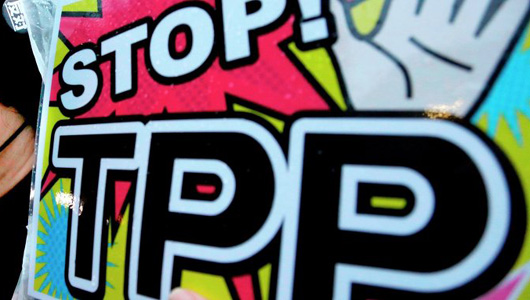
WASHINGTON – A recent poll on the controversial Trans-Pacific Partnership (TPP) so-called “free trade” pact tells us that workers and our allies have a massive public education job to do.
While asking about the Democratic presidential hopefuls and their issue stands, the Washington Post-ABC News poll reported on Oct. 21 that by a 44 percent-32 percent plurality, the general public supports the TPP. The other quarter of the electorate had no opinion.
More importantly, 51 percent of Democrats back the TPP. The rest were split between opposition and no opinion. Independents favored TPP by 41 percent-35 percent. So did Republicans: 39 percent-37 percent, within the survey’s margin of error.
The Post-ABC poll may be an outlier. If so, it’s a dangerous one. Several months ago, a roundup of surveys compiled by Public Citizen – a worker ally against fast-track and the TPP – showed majorities of up to 2-to-1 against fast-track and specifically against allowing the TPP under it. That ratio was solid for years, ever since a January 2014 union-commissioned poll.
“A May 2015 Reuters/Ipsos poll, for example, found that a majority of the U.S. public supports the concept of ‘new international trade agreements to promote the sale of American goods abroad,'” Public Citizen reported. “Who would be opposed to trade deals framed as simply boosting exports?
“But the poll did not address any elements of the TPP that made the sweeping deal so controversial. It did not ask, for example, whether respondents support ‘new international trade agreements that could offshore U.S. jobs,’ despite widespread concern about the TPP’s incentives for U.S. firms to relocate abroad.
“According to Ipsos’ own data from its other May, 2015 trade poll, had the Reuters/Ipsos survey mentioned the TPP’s actual content, the result would have been broad TPP opposition.”
If attitudes have flipped between May and now, especially among Democrats, then workers and their allies have an education job to do. Specifically, we must tell the public the TPP endangers their jobs. We need a factory worker to say how he lost his job to China under prior trade pacts and a call center worker to say how she lost her job to the Philippines under prior trade pacts. Both must say that TPP would produce a rerun.
The public must learn about the secret international trade court TPP would set up, with pro-business lawyers as the judges. They could trash your wage laws, your job safety laws, your Buy American laws and your environmental laws, all in the name of ensuring present and future corporate profits. There’s no opposition allowed in such cases, and no appeals, either.
People need to know that when President Obama says worker rights are written into the TPP, he’s wrong. The TPP tells its member nations to enforce their own labor laws, but there’s little penalty if they don’t. That means ordering Vietnam to enforce its minimum wage law – of just over 50 cents a day. That means ordering Brunei to enforce its anti-discrimination law, which allows rampant discrimination, or worse, against gays. Those are just examples.
People need to know that the TPP protects corporate patents at consumers’ expense. Drug firms are screaming because TPP cuts their exclusive patent monopolies on prescription drugs by several years. Monopolists price prescription drugs at $200 a pop or more. They’d still exist.
We must inform people that the TPP would let South Korean cars deluge the U.S., without tariffs, to compete with U.S.-made cars and U.S. workers.
We must tell the public, in short, why all of us – and our lawmakers-must oppose the TPP.
Photo: AP












Comments